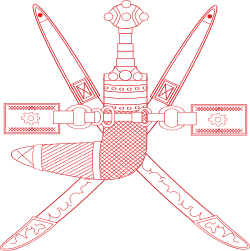| وزارة المالية | |
 | |
| Agency overview | |
|---|---|
| Formed | January 1941 [1] |
| Jurisdiction | Government of Oman |
| Headquarters | Muscat 23°36′48″N58°35′42″E / 23.61333°N 58.59500°E |
| Agency executive |
|
| Website | Official website |
 |
|---|
|
| Cabinet |
The Ministry of Finance (MOF) is the governmental body in the Sultanate of Oman responsible for all government financial matters.
Contents
The current Finance Minister is Sultan bin Salem bin Saeed al-Habsi. [2]